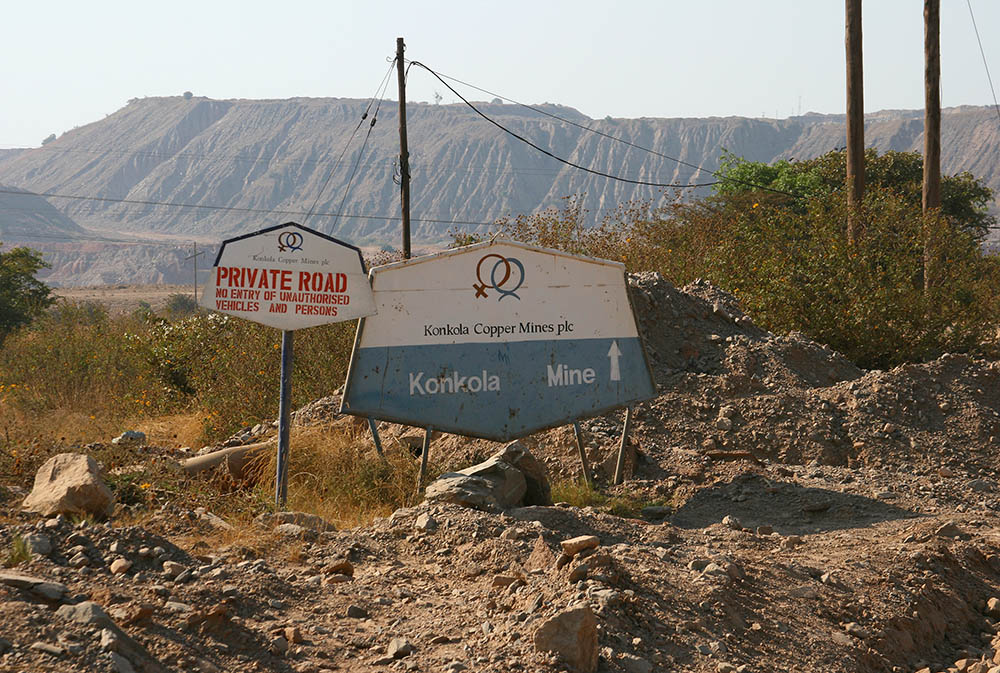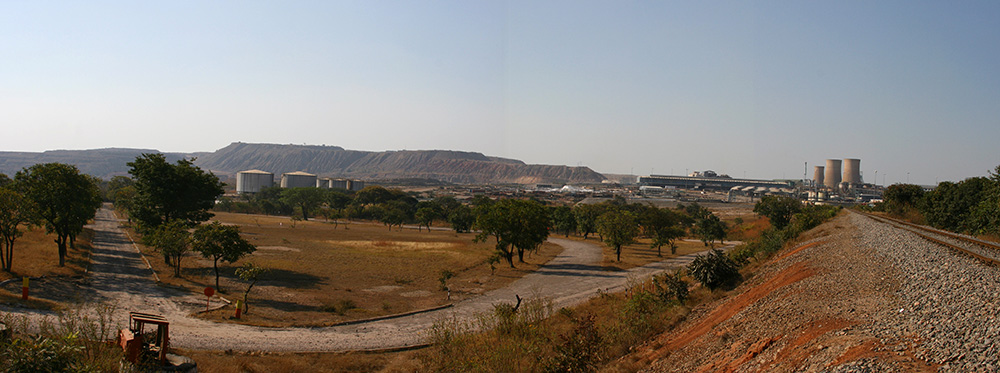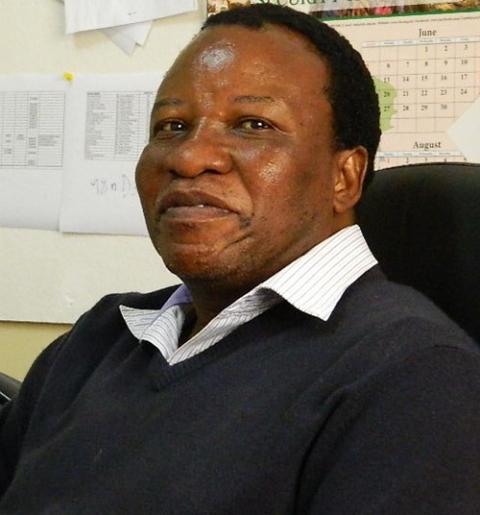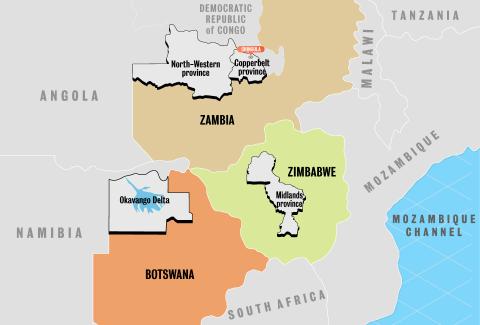
Villagers who say toxic waste from the Nchanga copper mine in Zambia's Chingola district affected their health, livestock and farmland have won a settlement from the London-based Vedanta Resources and its Zambian subsidiary, Konkola Copper Mines. (Wikimedia Commons/BlueSalo)
More than five years after taking one of Zambia's largest mining companies to court in England, villagers who say toxic waste from the Nchanga copper mine affected their health, livestock and farmland have won a settlement.
Terms of the Jan. 19 compensation, which will benefit some 2,500 people, were not disclosed, and London-based Vedanta Resources and its Zambian subsidiary, Konkola Copper Mines, did not admit responsibility for environmental impacts from the mine, which is located in Zambia's Chingola district.
The case is the latest in which communities affected by extractive industries in Africa have successfully sued a foreign parent company over a subsidiary's operations in their country. It also highlights what activists, including Catholic organizations, say is widespread lack of enforcement of environmental regulations.
Mining is a lucrative business in Africa. In West Africa, gold production is expected to reach 8 million ounces this year, an increase of 2.7% over 2020. In Zimbabwe alone, the government is seeking to boost investment in mining to $12 billion by 2023. Much of the investment comes from foreign companies.
But the boom comes at a cost to the environment. Zambia, Africa's second-largest copper producer, is one of the countries hit hardest by mining pollution.
"In the absence of regulations governing natural resource extraction, or when they are weak or poorly enforced, increased openness to foreign investment can accelerate unsustainable resource use patterns," Micomyiza Dieudonne, program officer at the Jesuit Centre for Theological Reflection in Lusaka, Zambia, told EarthBeat.

A view of the Nchanga copper mine in Zambia's Chingola district (Wikimedia Commons/BlueSalo)
Despite legal action like the Chingola case, many communities suffer similar problems in silence, either because they are not pursuing their right to redress or compensation or because governments are not holding mining companies to account.
Catholic organizations have been stepping into the gap, providing technical advice, raising awareness about the impacts of pollution from mining and pressuring governments and companies to ensure that toxic waste is handled properly.
In Zambia, where copper output is expected to hit 1 million tons this year, air and water are polluted by smelter emissions and dust from mines, waste rock and tailings piles, according to a 2019 report.
The impacts of the pollution have been most pronounced in Chingola, in the mineral-rich Copperbelt province, where villagers say toxic runoff from the Nchanga mine has been a problem since 2004. It has especially impacted children's health, they say, and has sickened cattle and contaminated their farmland, reducing crop yields and affecting their livelihoods.
The court case was part of an effort by church and other organizations to pressure the government to enforce mining regulations and hold companies accountable for violations, said Eugene Kabilika of Caritas Zambia.

Eugene Kabilika, executive director of Caritas Zambia (Courtesy of ZCCB)
Caritas Zambia and the Ndola Diocese's Caritas office, along with the international humanitarian agency ActionAid, helped collect evidence of contamination and raise awareness in the communities that eventually filed the lawsuit.
"Extractive companies must be taxed on their profits, to provide public services to benefit communities, and be made to adhere to environmental standards," said Nalucha Nganga Ziba, ActionAid's Zambia director. "There must be no bailouts or public investments in mining companies, which continue to pollute and contribute to climate change. They must no longer be allowed to act with impunity."
In the Copperbelt province, the Jesuit Centre for Theological Reflection has identified waste rock dumps, slag heaps and tailings dams covering nearly 40 square miles. That area represents "a loss of opportunity for the local population in terms of other land use, such as agriculture, forestry, housing [or] ranching," the center's Dieudonne told EarthBeat.
Besides the Copperbelt province, there is also widespread contamination in the North-Western and Central provinces, Kabilika told EarthBeat.
A century of lead pollution from mines and a smelter have made the town of Kabwe, in the Central province, one of the most polluted in the world. Lead poisoning causes neurological and developmental problems, especially in children. Kabilika said children in Kabwe are especially affected by stunted growth and neurological and cognitive problems.
In the North-Western province, runoff from a copper mine owned by First Quantum Minerals has polluted the Musangezhi River, which has been a source of livelihood for local communities for many years, Dieudonne told EarthBeat. Increased deforestation due to mining and charcoal production has largely contributed to the disappearance of a grub known as the vinkubala, which is a local delicacy, around mining communities, he said.
Mining causes other kinds of damage, as well. In Zambia's North-Western province, blasting at Barrick Gold Corporation's Lumwana mine has caused cracks in houses in Manyama, in the Kalumbila district, Dieudonne said.
According to Kabilika, the main reason for ongoing pollution from mining operations is that companies in Zambia "are not willing to curb their discharge and there is no law that compels them to minimize damage" to the environment.
Advertisement
Because of lax government enforcement, "nothing happens [when] there is serious pollution in some mining areas where hazardous substances found their way into streams where communities rely on for water. Until this is reviewed the situation will remain the same," Kabilika said.
The Jesuit center and Caritas are involved in efforts to bring mining companies, government officials and local community members together to ensure that the revenues from mining benefit the communities living around Zambia's mines.
The problem of pollution from mining and oil operations, especially the contamination of water sources, also affects other African countries, Dieudonne said.
In neighboring Zimbabwe, the Zimbabwe Environmental Law Association has documented poor adherence to environmental standards by gold miners in the Zvishavane mining area in Midlands province.
The organization has mapped environmental impacts in 135 mining sites in that area, and Zvishavane is just one of many mining districts in Zimbabwe.
The group worries that environmental impacts will become more widespread as more Zimbabweans take up small- to medium-scale "artisanal" or "informal" mining, which is poorly supervised or unregulated. Those miners, who produce more than half of Zimbabwe's mining output, often lack environmental impact assessments for their operations.
The allure of investment in extractive industries is also tempting African countries to approve fracking and oil exploration in game reserves and other protected areas. In 2020, Zimbabwe's government backpedaled on a license that allowed Chinese mining companies to explore for coal in the Hwange National Park.
Meanwhile, in Botswana's Okavango Delta, Recon Africa is inching closer to oil drilling. Scientists fear that drilling there could affect water resources, including an aquifer that provides water for people in Namibia, Botswana and South Africa.
Activists who are worried about the impacts of oil and gas operations point to Nigeria's Niger Delta region, where oil spills have poisoned water and land, destroying fisheries, agriculture and drinking water supplies.
Increasingly, local communities and organizations that support them are seeking redress against the foreign parent companies of mining and oil corporations operating in Africa.
The settlement in England between villagers from Chingola, Zambia, and Vedanta Resources followed a similar case in which Nigerian farmers successfully sued Royal Dutch Shell in the Netherlands. A British court recently agreed to admit a similar suit against Shell.
The lawsuit, filed by 42,500 farmers and fishermen from the communities of Ogale and Bille, in the Niger Delta, argues that the local residents' livelihoods have been affected by persistent oil spills that have contaminated land, swamps, groundwater and waterways, and that efforts to clean up the spills have been inadequate.






